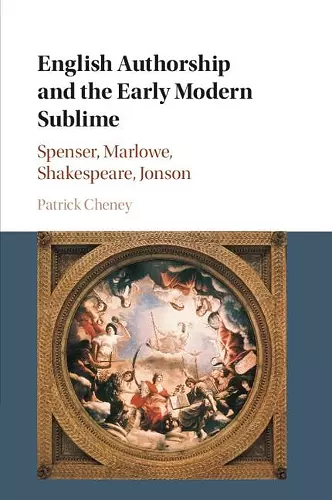English Authorship and the Early Modern Sublime
Spenser, Marlowe, Shakespeare, Jonson
Format:Paperback
Publisher:Cambridge University Press
Published:23rd Jun '22
Currently unavailable, and unfortunately no date known when it will be back
This paperback is available in another edition too:
- Hardback£94.00(9781107049628)

Linking ecstasy with art and liberty, the book advances understanding of Renaissance literature as a field in the humanities today.
Studying the sublime in late sixteenth- and early seventeenth-century writing, this book advances our understanding of Renaissance literature as a field in the arts and humanities today. Above all, the chapters feature a model of creative excellence and social liberty that explains the greatness of the English literary Renaissance.Patrick Cheney's new book places the sublime at the heart of poems and plays in late sixteenth- and early seventeenth-century England. Specifically, Cheney argues for the importance of an 'early modern sublime' to the advent of modern authorship in Spenser, Marlowe, Shakespeare, and Jonson. Chapters feature a model of creative excellence and social liberty that helps explain the greatness of the English Renaissance. Cheney's argument revises the received wisdom, which locates the sublime in the eighteenth-century philosophical 'subject'. The book demonstrates that canonical works like The Faerie Queene and King Lear reinvent sublimity as a new standard of authorship. This standard emerges not only in rational, patriotic paradigms of classical and Christian goodness but also in the eternizing greatness of the author's work: free, heightened, ecstatic. Playing a centralizing role in the advent of modern authorship, the early modern sublime becomes a catalyst in the formation of an English canon.
'A remarkable and important study that not only provides the missing link in the history of the sublime, but also redirects the reader towards what is truly great about the literature we read, study, and teach, and why. It is an extraordinarily ambitious project: the work maintains an intellectual focus, energy, and generosity throughout that explains and actually exemplifies the sublime.' Catherine Bates, University of Warwick
'In English Authorship and the Early Modern Sublime, Cheney … asserts that the early modern era functions as a crucial link in understanding the sublime. Recommended.' K. K. Smith, Choice
'Patrick Cheney, observing a resurgence of interest in the idea of the sublime, has contributed an original and persuasive book on this subject … The book meticulously catalogs and analyzes uses of the word sublime throughout the period.' Richard F. Hardin, Renaissance Quarterly
ISBN: 9781107627918
Dimensions: 228mm x 150mm x 18mm
Weight: 480g
330 pages